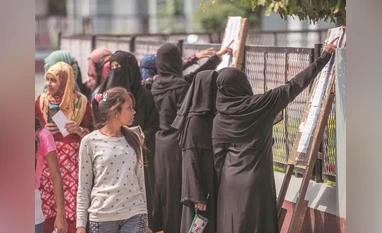UMEED : Universal Management, Empowerment, Efficiency, and Development

Context
- The Ministry of Minority Affairs has launched an additional module on the UMEED Portal to extend financial support from Waqf-alal-aulad properties to widows, divorced women, and orphans.
- This aligns with the government’s broader focus on inclusive development, women empowerment, and digital governance.
Key Features
- Beneficiaries – widows, divorced women, and orphans from minority communities.
- Digital Authentication – Aadhaar-based verification to avoid duplication and ensure genuine beneficiaries.
- Process – Fully online application & approval system handled by respective State/UT Waqf Boards.
- Financial Support – Direct Benefit Transfer (DBT) to beneficiaries’ bank accounts.
- Source of Funds – Income from Waqf-alal-aulad properties (family-oriented charitable endowments).
Significance
- Empowerment of Vulnerable Groups – strengthens the social security net for minority women and children.
- Good Governance – promotes transparency, efficiency, and accountability in Waqf property management.
- Digital India Push – aligns with e-governance and paperless service delivery.
- Reforms in Waqf Administration – makes Waqf Boards more people-centric and transparent, reducing misuse of endowment funds.
Challenges
- Digital Divide – beneficiaries may lack digital literacy or access to devices/internet.
- Awareness Gap – success depends on outreach among marginalized women and orphans.
- Implementation Bottlenecks – coordination between State/UT Waqf Boards, Mutawallis, and beneficiaries may face hurdles.
- Monitoring & Accountability – ensuring funds reach the right hands without leakages remains critical.
UPSC Relevance
- GS-II (Governance & Social Justice): Government schemes, welfare of vulnerable sections, issues in minority rights.
- GS-II (Polity): Role of statutory bodies like Waqf Boards.
- Essay/Ethics: Inclusive development, women empowerment, good governance principles.
✅ Takeaway for UPSC:
The UMEED Portal Module exemplifies digital welfare delivery targeting minority women and children, combining social justice with tech-driven governance. It reflects the government’s focus on empowerment, inclusivity, and transparency in managing community resources like Waqf.
Updated : Aug 27 2025 | 10:44 PM IST | Business Standard
UPSC IAS Civil Services Current Affairs Governance Minority Affairs Waqf Properties UMEED Portal Digital Governance Transparency in Administration E-Governance Geo-tagging GIS Mapping Public Accountability Social Justice Empowerment of Minorities Women and Children Welfare Community Assets Inclusive Development PIB Eminent IAS Eminent Eduventure State PCS BPSC UPPSC MPPSC RPSC UKPSC JPSC WBCS TNPSC KPSC MPSC HPSC OPSC GPSC APPSC TSPSC SSC CGL SSC CHSL SSC MTS SSC GD RRB NTPC RRB Group D Banking Exams